新概念英语第二册第一课详细教案
新概念英语第二册第一课详细教案

课文:Last week I went to the theatre. I had a very good seat. The play was very interesting. I did not enjoy it. A young man and a young woman were sitting behind me. They were talking loudly. I got very angry. I could not hear the actors. I turned round. I looked at the man and the woman angrily they did not pay any attention. In the end, I could not bear it. I turned round again. “I can’t hear a word!〞I said angrily. “It’s none of your business〞, the young man said rudely, “This is a private conversati on!〞*本课重点语法:一般过去时、过去进行时英语的时态细分共有16种,其中较多用的为9种:第一课分析其中三种:一般现在时,一般过去时和过去进行时1.经常、反复或是习惯性发生的动作,如I go to work at 0900 every day. 我每天9点钟上班。
She does not take dinner on Sundays. 她周日晚上都不吃晚餐。
2.某种事物目前存在的情况或状态,如There are 16 cabins available on Classica Feb 18 dep.目前经典号0218航次剩余16个舱位。
3.表示主语的习惯、能力、职业、特征等,如Sunwen works as a sales manager in Costa, he has rich experience.4.有时间规律发生的事件或是不受时间限制的客观事实,如The earth moves around thesun. 地球绕着太阳转。
新概念2册第一课教案
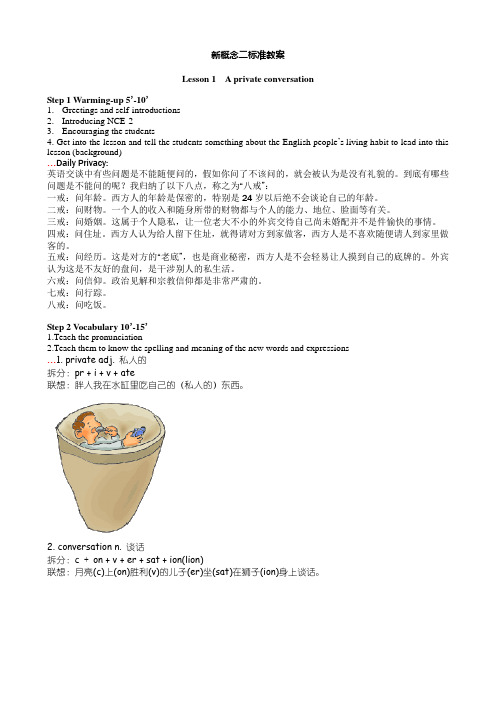
新概念二标准教案Lesson 1 A private conversationStep 1 Warming-up 5’-10’1.Greetings and self-introductions2.Introducing NCE-23.Encouraging the students4. Get into the lesson and tell the students something about the English people’s living habit to lead into this lesson (background)…Daily Privacy:英语交谈中有些问题是不能随便问的,假如你问了不该问的,就会被认为是没有礼貌的。
到底有哪些问题是不能问的呢?我归纳了以下八点,称之为“八戒”:一戒:问年龄。
西方人的年龄是保密的,特别是24岁以后绝不会谈论自己的年龄。
二戒:问财物。
一个人的收入和随身所带的财物都与个人的能力、地位、脸面等有关。
三戒:问婚姻。
这属于个人隐私,让一位老大不小的外宾交待自己尚未婚配并不是件愉快的事情。
四戒:问住址。
西方人认为给人留下住址,就得请对方到家做客,西方人是不喜欢随便请人到家里做客的。
五戒:问经历。
这是对方的“老底”,也是商业秘密,西方人是不会轻易让人摸到自己的底牌的。
外宾认为这是不友好的盘问,是干涉别人的私生活。
六戒:问信仰。
政治见解和宗教信仰都是非常严肃的。
七戒:问行踪。
八戒:问吃饭。
Step 2 Vocabulary 10’-15’1.Teach the pronunciation2.Teach them to know the spelling and meaning of the new words and expressions…1. private adj. 私人的拆分:pr + i + v + ate联想:胖人我在水缸里吃自己的(私人的)东西。
新概念英语第二册第一课详细教案
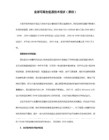
语一般为名词、代词或名词短语,通常位于动词之前。动词必须
“一致”,所以主语决定动词的单复数形式(如 I am, you are, he
。宾语一般为名词、代词或名词短语。在主动句中,宾语一般位
副词时,地点副词的一般位置是在方式副词
通常我们讲
be动词的适当形式填空。
2 / 7
Yesterday was______ the first of
All the students __are____ very excited.
______________________________________________
上教堂,去做礼拜 (cf.第1册第68课at school, at church;
1册第85课have been to school/church)
座位很好
一般指戏院、汽车等配置的固定座位,也可以抽象地表示“座位”
汽车的前座
请坐。
戏很有意思。
属于现在分词形式的形容词,意思是“使人感兴趣”。
fall sick。
4 / 7
上星期我去看戏。
句首的“Last week”点明叙述的事情发生的时间是上星期。因此整
(包括过去进行时),直接引语部分的
动词go的原义是离开一个地方去另一个地方,与介词to连用后,
请注意在以下的短语中名词前通常不加冠词:
上学
上床睡觉
1 / 7
:
( he, she, it,
,动词的词尾要加-S。(一般的动词词尾+S。以sh/ch/s/x结尾的
+es.以辅音字母Y结尾的把Y变成i,+es。辅音字母+o结尾的+es.)
新概念2第一课教案
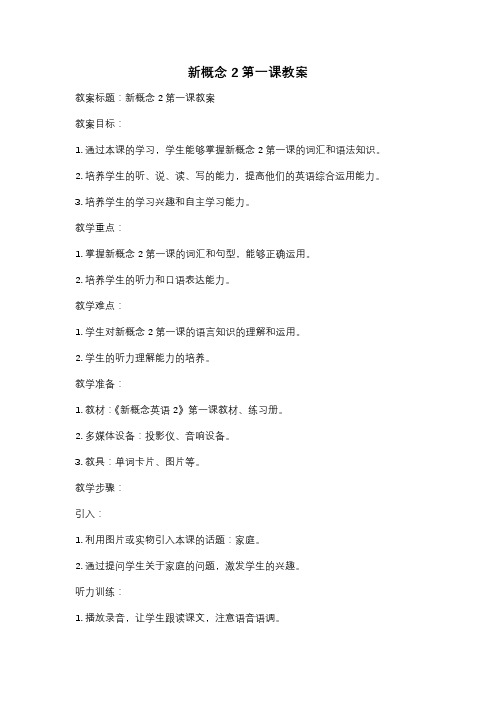
新概念2第一课教案教案标题:新概念2第一课教案教案目标:1. 通过本课的学习,学生能够掌握新概念2第一课的词汇和语法知识。
2. 培养学生的听、说、读、写的能力,提高他们的英语综合运用能力。
3. 培养学生的学习兴趣和自主学习能力。
教学重点:1. 掌握新概念2第一课的词汇和句型,能够正确运用。
2. 培养学生的听力和口语表达能力。
教学难点:1. 学生对新概念2第一课的语言知识的理解和运用。
2. 学生的听力理解能力的培养。
教学准备:1. 教材:《新概念英语2》第一课教材、练习册。
2. 多媒体设备:投影仪、音响设备。
3. 教具:单词卡片、图片等。
教学步骤:引入:1. 利用图片或实物引入本课的话题:家庭。
2. 通过提问学生关于家庭的问题,激发学生的兴趣。
听力训练:1. 播放录音,让学生跟读课文,注意语音语调。
2. 播放录音,学生听录音并完成相关的听力练习。
3. 分组进行对话练习,模仿录音中的对话内容,练习听力和口语表达能力。
语言知识讲解:1. 教师介绍本课的重点词汇和句型,并进行解释和示范。
2. 学生跟读词汇和句型,进行口语练习。
语法练习:1. 学生根据教师的指导,完成相关的语法练习。
2. 教师对学生的练习进行纠正和指导。
拓展活动:1. 学生分组进行角色扮演,模拟对话情景,练习语言交际能力。
2. 学生自由发挥,用所学知识编写小短文,展示他们的写作能力。
总结:1. 教师对本课的重点内容进行总结,并进行复习。
2. 学生进行小结,回答教师提出的问题。
作业布置:1. 布置课后作业,包括完成练习册相关练习、背诵课文等。
2. 鼓励学生自主学习,提供相关学习资源和建议。
教学反思:1. 教师对本节课的教学效果进行评估和反思。
2. 教师根据学生的反馈和表现,调整教学策略和方法。
注:以上教案仅为示例,实际教案编写时应根据具体教学内容和学生特点进行调整和完善。
新概念英语第二册第一课最全讲义
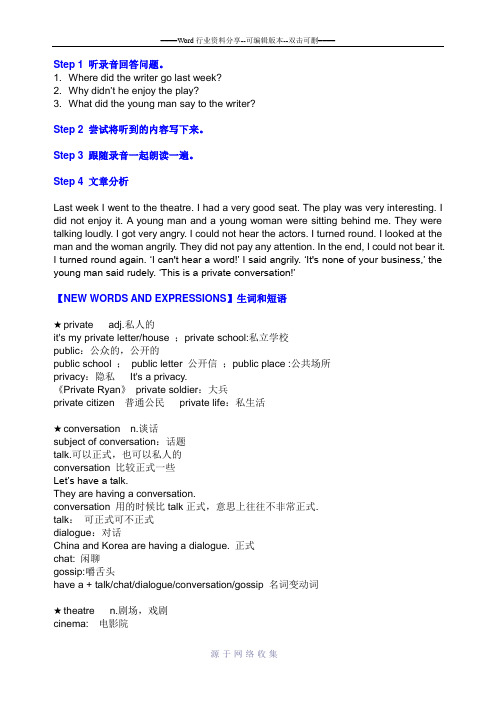
Step 1 听录音回答问题。
1. Where did the writer go last week?2. Why didn’t he enjoy the play?3. What did the young man say to the writer?Step 2 尝试将听到的内容写下来。
Step 3 跟随录音一起朗读一遍。
Step 4 文章分析Last week I went to the theatre. I had a very good seat. The play was very interesting. I did not enjoy it. A young man and a young woman were sitting behind me. They were talking loudly. I got very angry. I could not hear the actors. I turned round. I looked at the man and the woman angrily. They did not pay any attention. In the end, I could not bear it.I turned round again. ‘I can't hear a word!’ I said angrily. ‘It's none of your business,’ the young man said rudely. ‘This is a private conversation!’【NEW WORDS AND EXPRESSIONS】生词和短语★private adj.私人的it's my private letter/house ;private school:私立学校public:公众的,公开的public school ;public letter 公开信;public place :公共场所privacy:隐私It's a privacy.《Private Ryan》private soldier:大兵private citizen 普通公民private life:私生活★conversation n.谈话subject of conversation:话题talk.可以正式,也可以私人的conversation 比较正式一些Let’s have a talk.They are having a conversation.conversation 用的时候比talk正式,意思上往往不非常正式.talk:可正式可不正式dialogue:对话China and Korea are having a dialogue. 正式chat: 闲聊gossip:嚼舌头have a + talk/chat/dialogue/conversation/gossip 名词变动词★theatre n.剧场,戏剧cinema: 电影院★seat n.座位have a good seat(place)take a seat : 座下来,就座take your seat/take a seatIs the seat taken? 这个座位有人吗?no/yessit Sit down ,pleaseseat Take your seat, please.Be seated, please 更为礼貌seat是及物动词,后面有宾语sit是不及物动词,后面不加宾语seat后面会加人; seat sb; seat him; seat:让某人就座sit he is sitting there.you seat him;〖语法精粹〗When all those present__, he began his lecture.A. sitB. seatC. seatedD. were seatedsit, sit down; seat, be seated; take a seat★play n.戏★loudly adv. 大声的★angry adj. 生气的cross=angry ; I was angry. He was cross.Don't get cross with me, it wasn't my fault.不要对我生气,那不是我的错。
教案新概念英语第二册标准教案第一课
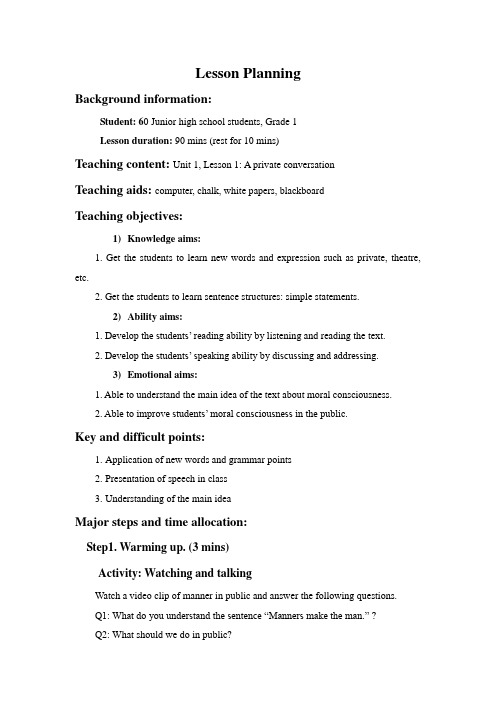
Lesson PlanningBackground information:Student: 60 Junior high school students, Grade 1Lesson duration: 90 mins (rest for 10 mins)Teaching content: Unit 1, Lesson 1: A private conversationTeaching aids: computer, chalk, white papers, blackboardTeaching objectives:1)Knowledge aims:1. Get the students to learn new words and expression such as private, theatre, etc.2. Get the students to learn sentence structures: simple statements.2)Ability aims:1. Develop the students’ reading ability by l istening and reading the text.2. Develop the students’ speaking ability by discussing and addressing.3)Emotional aims:1. Able to understand the main idea of the text about moral consciousness.2. Able to improve students’ moral consciousness in the publi c.Key and difficult points:1.Application of new words and grammar points2.Presentation of speech in class3.Understanding of the main ideaMajor steps and time allocation:Step1. Warming up. (3 mins)Activity: Watching and talkingWatch a video clip of manner in public and answer the following questions.Q1: What do you understand the sentence “Manners make the man.” ?Q2: What should we do in public?Step2. Pre-reading. (3 mins)Activity: Listening.Listen to the tape and then answer the question.Q: Why did the writer complain to the people behind him?Step3. While-reading. (10 mins)Activity 1: Skimming. (4 mins)Read the whole text and answer the following questions.Q1: What is the writing style of the text, narrative writing or descriptive writing?Q2: What is the general idea of the text?Activity 2: Scanning. (6 mins)Scan the text and complete the following tabulation.6 1 2 3 4 5 6When? Who?which?what? Action Who?which?what?How? Where? When?Last week I went to thetheatreI had a verygood seatThe play was veryinterestingI did notenjoythe playA young man and a young womanweresittingbehindmeThey weretalkingloudlyActivity 3: Close reading. (24 mins)1)Vocabulary and phrase.private adj.私人的conversation n.对话theatre n.戏院attention n.注意bear v.容忍turn round 转身pay attention注意none of your business不关你的事2)Sentence structures.1.Simple statements: A statement that tells us about one thing is a simple statement.2.Word order of simple statements: The order of words in a statement can affect the meaning of the statement.3)The tense.1.the past tense2.past continuous tense3.the present tense4)Main idea .Summarize the main idea of this text: Good manners in public are very important.Have a short break. (10 mins)Step4. Post-reading. (38 mins)Activity1. Make a short speech. (15 mins)Make a short speech about manners in public according to the following key words:speak loudly, rudely, knock at the door, spit, smoke, lady first...Activity2. Group work. (10 mins)Discuss with your partner “What did you do yesterday after school?”Use the simple statement to express your idea with right tense.Activity3. Exercise. (13 mins)Do exercise B on your textbook and then we will check it.Homework. (2mins)Finish the rest of exercises on your textbook and preview the next text.。
新概念第二册第一课教案
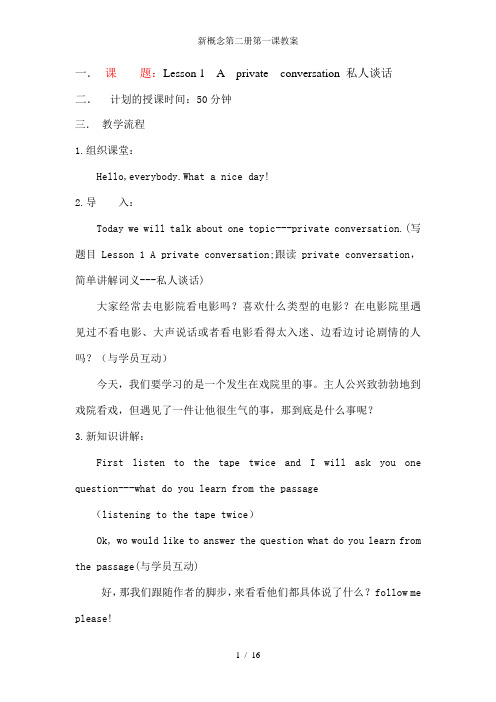
一.课题:Lesson 1 A private conversation 私人谈话二.计划的授课时间:50分钟三.教学流程1.组织课堂:Hello,everybody.What a nice day!2.导入:Today we will talk about one topic---private conversation.(写题目Lesson 1 A private conversation;跟读private conversation,简单讲解词义---私人谈话)大家经常去电影院看电影吗?喜欢什么类型的电影?在电影院里遇见过不看电影、大声说话或者看电影看得太入迷、边看边讨论剧情的人吗?(与学员互动)今天,我们要学习的是一个发生在戏院里的事。
主人公兴致勃勃地到戏院看戏,但遇见了一件让他很生气的事,那到底是什么事呢?3.新知识讲解:First listen to the tape twice and I will ask you one question---what do you learn from the passage(listening to the tape twice)Ok, wo would like to answer the question what do you learn from the passage(与学员互动)好,那我们跟随作者的脚步,来看看他们都具体说了什么?follow me please!(Read the passage following me and read it by the students themselves)生词与短语讲解:1.private/`praivit/adj.○1私人的,秘密的a private conversation/letter 私人交谈/信函Eg: they were sharing a private joke.他们讲着外人听不懂的笑话。
新概念第二册第一课教案

新概念第二册第一课教案教案标题:《新概念第二册第一课教案》教案目标:1. 通过本课的教学,学生能够掌握并正确运用本课所涉及的词汇和语法知识。
2. 培养学生的听、说、读、写能力,提高他们的英语综合运用能力。
3. 培养学生的合作意识和团队精神,通过小组活动促进学生之间的互动与合作。
教学重点:1. 通过听力训练,学生能够理解并正确运用本课所涉及的词汇和语法知识。
2. 通过口语训练,学生能够流利地表达自己的观点和意见。
3. 通过阅读训练,学生能够理解并运用本课所涉及的词汇和语法知识。
4. 通过写作训练,学生能够独立撰写一篇关于自己的家庭的短文。
教学准备:1. 课件、录音机、幻灯片等教学辅助工具。
2. 学生练习册、课本及相关教材。
3. 学生小组活动所需的材料。
教学过程:Step 1: 导入 (5分钟)1. 利用图片或实物引入本课话题,激发学生的学习兴趣。
2. 利用问题导入,如“你家有几口人?你们都住在一起吗?请介绍一下你的家庭。
”Step 2: 听力训练 (15分钟)1. 播放录音,让学生跟读并理解录音中的对话内容。
2. 分组进行听力练习,要求学生能够听懂并回答与家庭成员相关的问题。
3. 教师讲解并操练本课所涉及的词汇和语法知识。
Step 3: 口语训练 (15分钟)1. 学生分组进行角色扮演,模拟对话中的情景,练习表达自己的家庭情况。
2. 教师引导学生进行问答练习,加深对话内容的理解并提高口语表达能力。
Step 4: 阅读训练 (15分钟)1. 学生独立阅读课文,理解并标记重点词汇和句子。
2. 学生小组合作,回答与课文内容相关的问题,加深对课文的理解。
Step 5: 写作训练 (15分钟)1. 学生根据所学内容,独立撰写一篇关于自己家庭的短文。
2. 学生小组互相交换并修改彼此的短文,提高写作质量。
3. 部分学生上台展示自己的短文,进行同伴评价和教师点评。
Step 6: 小结与延伸 (5分钟)1. 教师对本课内容进行总结,并强调学生在学习过程中的进步和发现。
新概念2第一课教案

Lesson 1 - A private conversation一、教学重点1、句法:简单陈述句的句子成分(故事六要素)。
3、习语:I can not bear it! It’s none of your business!二、教学步骤【第一节课】1、引入话题(详见右框)。
2’2、听一遍音频,掌握大意。
1’①Where did the writer go last week?②Why didn’t he enjoy the play?③What did the young man say to the writer?3、生词解读,纠正发音(详见课本)。
5’4、提问:Why did the writer complain to the peoplebehind him? 看一遍视频,解答问题。
2’(屏幕升起)5、精讲课文,板书和笔记(详见下文)。
20’6、文化背景(详见下文)。
2’7、再听一遍音频,逐句跟读。
3’8、学生自己大声朗读。
5’(课间时可让学生先看看15页的两道选择理解题)【第二节课】1、做15页的两道选择理解题(详见课本)。
5’2、检查朗读,一起朗读,注意每一句话。
10’3、讲解简单陈述句的概念(详见下文)。
5’4、游戏:讲故事的六要素(详见下文)。
15’5、练习分析课文中每句话的要素构成。
5’6、做14页的排列句子成分练习题。
7’7、做15页最后一道句子结构题(详见课本)。
3’【第三节课】(屏幕放下)1、超级情景背诵图讲解。
5’2、背课文比赛。
20’3、听一首英文歌曲《I believe I can fly》。
7’4、听写单词,记忆法指点。
10’5、总结本课出现的三种时态:一般过去时、过去进行时、一般现在时(详见下文)。
5’6、总结本课重点,让学生标注(详见上文)。
2’7、布置作业:摘要写作,15页的选择题,背课文和单词。
1’三、精讲课文1、Last week 上周。
这个词组奠定了本课用一般过去时的基础。
新概念英语2 Lesson1到5课 教学设计

新概念英语2 Lesson1到5课教学设计Lesson1 教学设计一、核对、讲解*课后作业,听写单词二、单词private adj.私人的 conversation n.谈话 complain 抱怨theatre n.剧场,戏院 go to the theatre 去看戏attention n.注意 pay attention 注意seat n.座位 play n.戏 v.玩 bear/bore/borne v.容忍busy adj.忙 business n.事 none of your business不关你的事angry adj.生气的 angrily adv.生气地 loud adj.大声的 loudly adv.大声地rude adj.粗鲁的 rudely adv.粗鲁地go to the theatre/cinema 去剧场看戏/去电影院看电影go to school /bed/churth 上学/睡觉/去教堂enjoy sth/doing sth 喜欢某事/做某事 sth可为名词、代词、反身代词、动名词eg.enjoy the book /it/singing/yourselfpay v. 支付 pay 50 dollars/pay mony for sthv.给予(注意等);去(访问) pay attention/pay a visit拜访n.工资,报酬 receive my pay 领到我的工资bear sth 承担;负担/忍受 eg. Who will bear the cost?谁来承担费用?bear to do sth/doing sth eg.I can’t bear to watch/watching her.三、语法陈述句语序:主语+动词+宾语+状语四、作业完成1后作业,练习册,记单词Lesson2 教学设计一、核对、讲解1课后作业,听写单词二、单词Breakfast n. 早餐 lunch n.中餐 dinner n. 晚餐 brunch n.早中餐aunt n.阿姨 uncle n.叔叔 get up 起床 go to bed 去睡觉 stay in bed 呆在床上early adj./adv.早期 sometimes adv.有时 lunchtime n.午餐时间 look out of 向外看 outside adv. 外面just then 就在那时 ring/rang/rung v.响起铃声 arrive/arrived/arrived v.到达 repeat v.重复1.on Sundays 在星期天的时候,复数形式指每个星期天,或者大部分星期天,与一般现在时连用,表示经常性行为 eg. We do not go to school on Sunday.2.until 一直到……为止,在……以前,用于表示动作、状态的持续在肯定句中,它表示持续性状态的动词连用,表示持续到某一时刻eg. I’ll wait here until5.在否定句中,它通常与描述短暂动作的动词连用,表示直到……为止,直到……才eg.She cannot arrive until6.三、语法现在进行时1.表示说话时,正在进行的动作或正在发生的事件,往往与now,just,still等副词连用eg. John is still sleeping.2.现在进行时也用来表示当前(一段时间)的动向eg.Jack is working hard these days.以what开头的感叹句:What+adj+n.+主语+谓语!1.主语和谓语经常被省略:eg.What an interesting play!eg.What fools they are!2.如果没有形容词,则往往表示批评或不大好的意思:eg.What a day!四、作业完成1后作业,练习册,记单词Lesson3 教学设计一、核对、讲解2课后作业,听写单词二、单词send/sent/sent v.寄,送 send me a card 给我寄张明信片 postcard明信片spoil/spoilt&spoiled vi.变质;掠夺vt.损坏 go/went/gone 去;走 sit/sat/sat坐teach/taught/taught v.教授 lend/lent/lent借给 read/ read/ read读understand/understood/ understood理解 think/thought/thought 思考get/got/got 收到 get up起床 buy/bought/bought 买 spend/spent/spent 花费holiday n.假日 on holiday在休假中 public adj.大众的 in public公开地;当众summer夏天/spring春天/autumn秋天/winter冬天season季节Italy n.意大利 Italian n.意大利人;意大利语 museum n.博物馆 garden n.花园friend n.朋友;友人 friendly adj.友好的 friendly match 友谊赛wait v.等待 waiter n.服务员;伺者 line n.线条;行 whole adj.整个的quick adj.快的 quickly adv.快速地 decision n.决定 make a decision做决定single adj.单一的;唯一的 double adj.双的三、语法vt.及物动词VS不及物动词vi.许多及物动词后可跟两个宾语,如 give sb sth或者 give sth to sb直接宾语通常是sth,间接宾语通常是sb,通常间接宾语在前,如果想要强调直接宾语也可以将之置于动词之后、间接宾语之前,那么间接宾语之前需加介词to或者forgive/buy/lend/tell/payeg.I bought David a book yesterday./I bought a book for David.四、作业完成2课后作业,练习册,记单词Lesson4 教学设计一、核对、讲解2课后作业,听写单词二、单词excite vt.激发 excited adj.兴奋的 exciting adj.令人激动的 trip n.旅游 v.绊倒 trip/tripped/ trippedreceive/ received/ received v.收到 visit/ visited/ visited v.拜访buy/bought/ bought v.买 go/went/gone v.走 fly/flew/flown v.飞行just adv.刚才 already adv.已经 never adv.从不 brother n.兄弟Australia n.澳大利亚 Australian n.澳大利亚人second 秒 minute分钟 hour 小时 day 天 week 周 month 月 year 年engineer n.工程师 engine n.发动机 work v.工作 work for 为……工作 firm n.公司 company n.公司number n.数字 a large number of 很多 centre n.中心 in the centre of 在…的中心位置abroad adv.到国外 be abroad 出国三、语法1.常和现在完成时连用的副词和副词短语:Before(now)(在此)之前、so far 到目前为主、up to now 直到现在、just 刚刚、already已经lately 最近疑问句和否定句中常用:ever 曾经 yet 还 never 从不 not…ever 从来没有2.同位语一个名词/短语与另一个名词/短语并列而作为其说明或限定成分时成为同位语。
新概念第二课(第一课时)教案(精选五篇)

新概念第二课(第一课时)教案(精选五篇)第一篇:新概念第二课(第一课时)教案新概念第二册第一课《A Private Conversation》教案教案设计设计人:赖老师课题:A Private Conversation 课时:第一课时(40min),新授课(阅读)教学目标:1.熟读课文,掌握课文中的词汇与短语;2.了解在剧院看戏礼仪,培养良好情操。
教学难点:1.回顾与复习一般过去时;2.用英语话概况课文主要内容;3.go to the theatre 与 go to theatre的区别。
教学案例:T(T eacher)Ss(Students)T: Good afternoon, students!Do you like watching movies or plays? 大家喜欢看电影或者戏剧吗?Ss: Yes!T:(To show the posts of the latest movies)T: We call these “movie”.(T o learn the new word)Ss:(T o read after the teacher)T:(To show the posts of the four classical plays in Broadway)We call these “plays”.Ss:(To read after the teacher)T: Where do we watch the movies? Ss: 电影院、剧院T: cinema,theatre Ss:(To read after the teacher)T:(To introduce the Broadway)T: If we speak loudly in the theatre how would the other audiences think of us? 如果我们在剧院里面大声喧哗,周围的观众会怎么样看待你呢?Ss: 生气!会觉得你素质低!T: So everyone knows that the bad manner would bother the others, right? So the word “生气”in English we call “angry”.Ss:(To read after the teacher)T:(To learn and read thenew words and expressions)Ss:(To read after the teacher)T: Before reading our context, let’s think about these questions.The first, where did the writer go last week? The second, why did the writer complain about the people behind him? The third, what did the young man say to the writer? T:(To read the context or play the tape)T:(To ask volunteers to answer the questions)Ss: …… T: 我们想想课文中的第一句go to the theatre是什么意思? Ss: 嗯,应该是“去戏院”的意思。
新概念英语第二册第一课教案 (1)PPT课件

an informal talk in which people exchange news, feelings, and thoughts
12
• Theatre:
places to see a film, cinema
• Loudly:
adverb for loud, opposite to low
2
Good manners or not?
• Help the old people.
3
• Pick flowers in the park.
4
• Knock at the door before entering a room
5
• Spit
6
• Jump over the fence
7
• Throw rubbish onto the ground
Lesson 1 A private conversation
By Ariel 14.May,2012
1
Warming up
“Manners make the man.” 观其待人而知其人。 What should we do in public? What can’t we do in public?
13
• Attention: May I have your attention please?
notice
• Bear: I can’t bear it anymore.
to be so upset about something that you feel unable to accept it or let it happen; stand
新概念第二册第一课教案
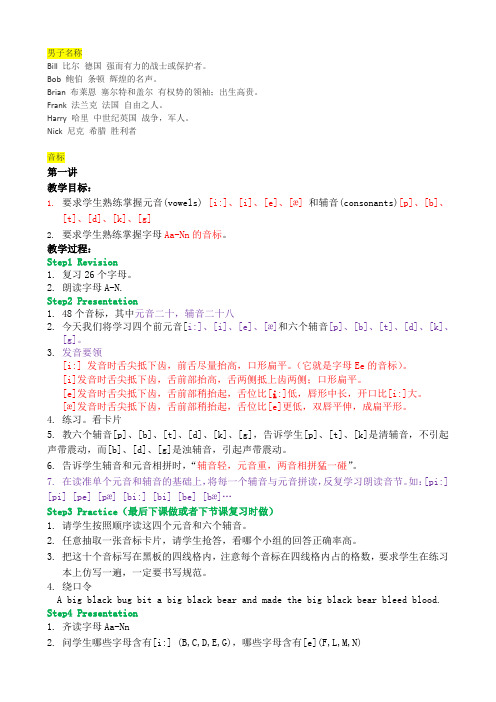
男子名称Bill 比尔德国强而有力的战士或保护者。
Bob 鲍伯条顿辉煌的名声。
Brian 布莱恩塞尔特和盖尔有权势的领袖;出生高贵。
Frank 法兰克法国自由之人。
Harry 哈里中世纪英国战争,军人。
Nick 尼克希腊胜利者音标第一讲教学目标:1.要求学生熟练掌握元音(vowels) [i:]、[i]、[e]、[æ]和辅音(consonants)[p]、[b]、[t]、[d]、[k]、[g]2.要求学生熟练掌握字母Aa-Nn的音标。
教学过程:Step1 Revision1.复习26个字母。
2.朗读字母A-N.Step2 Presentation1.48个音标,其中元音二十,辅音二十八2.今天我们将学习四个前元音[i:]、[i]、[e]、[æ]和六个辅音[p]、[b]、[t]、[d]、[k]、[g]。
3.发音要领[i:] 发音时舌尖抵下齿,前舌尽量抬高,口形扁平。
(它就是字母Ee的音标)。
[i]发音时舌尖抵下齿,舌前部抬高,舌两侧抵上齿两侧;口形扁平。
[e]发音时舌尖抵下齿,舌前部稍抬起,舌位比[i:]低,唇形中长,开口比[i:]大。
[æ]发音时舌尖抵下齿,舌前部稍抬起,舌位比[e]更低,双唇平伸,成扁平形。
4. 练习。
看卡片5. 教六个辅音[p]、[b]、[t]、[d]、[k]、[g],告诉学生[p]、[t]、[k]是清辅音,不引起声带震动,而[b]、[d]、[g]是浊辅音,引起声带震动。
6. 告诉学生辅音和元音相拼时,“辅音轻,元音重,两音相拼猛一碰”。
7. 在读准单个元音和辅音的基础上,将每一个辅音与元音拼读,反复学习朗读音节。
如:[pi:] [pi] [pe] [pæ] [bi:] [bi] [be] [bæ]…Step3 Practice(最后下课做或者下节课复习时做)1.请学生按照顺序读这四个元音和六个辅音。
2.任意抽取一张音标卡片,请学生抢答,看哪个小组的回答正确率高。
新概念第二册Lesson-1教案

Lesson 1A private conversation 私人谈话生词和短语★private adj.私人的it's my private letter/house ;private school:私立学校public:公众的,公开的public school ; public letter 公开信;public place :公共场所privacy:隐私 it's a privacy. adj.《Private Ryan》 private soldier:大兵private citizen 普通公民 private life:私生活★conversation n.谈话subject of conversation:话题 I have a conversation with sb. talk.可以正式,也可以私人的conversation. 比较正式一些let's have a talkThey are having a conversation.conversation 用的时候比talk正式,意思上往往不非常正式. talk:可正式可不正式dialogue:对话China and Korea are having a dialogue. 正式chat: 闲聊gossip:嚼舌头have a + talk/chat/dialogue/conversation/gossip 名词变动词动词:converse with sb;talk with/to sb talk about ;say(vt 说的内容),say sth, he said nothing ;speak(vt 讲语言) (vi 说话,谈话,speak to sb)speech n. make a speech;chat 聊天(talk friendly we had a long chat about old times);discuss (v 有着严肃目的的讨论 discussion);gossip(说闲话,嚼舌头 he is nothing but gossip)★theatre (口语:play house) n.剧场,戏剧(in US :theater UK:metre meter centre-center)Go to the theatre /go to the movies/go to the cinema/ go to the filmTheatre goer 、play goer戏迷cinema: 电影院★seat n.座位have a good seat(place)take a seat : 座下来,就座take your seat/take a seatIs the seat taken? 这个座位有人吗?no/yessit sit down ,pleaseseat take your seat,please、have a seat, pleasebe seated,please 更为礼貌seat是及物动词,后面有宾语sit是不及物动词,后面不加宾语seat后面会加人; seat sb; seat him; seat:让某人就座sit he is sitting there.you seat him;seat 座位:is this seat taken? 这儿能做吗seatbelt 安全带 in the driver’s seat=in the leader’s seat back-seat driver 爱指手画脚的人seat 席位,在国会里 win a seat, lose a seatvt. 安排。
新概念2教案第一课
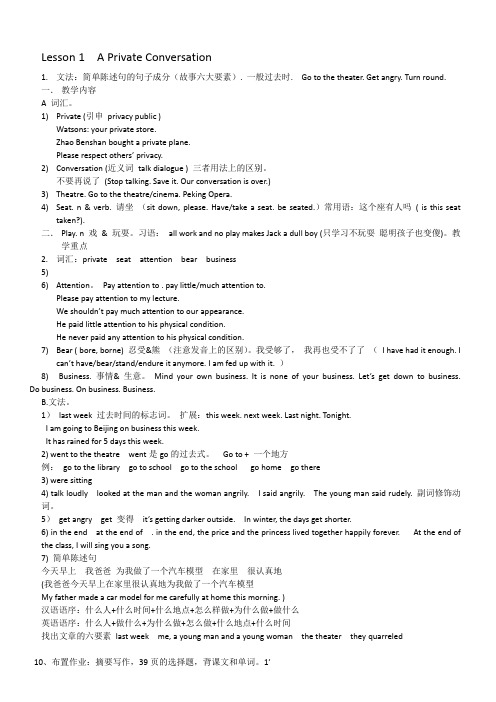
Lesson 1 A Private Conversation1.文法:简单陈述句的句子成分(故事六大要素). 一般过去时. Go to the theater. Get angry. Turn round.一.教学内容A 词汇。
1)Private (引申privacy public )Watsons: your private store.Zhao Benshan bought a private plane.Please respect others’ privacy.2)Conversation (近义词talk dialogue ) 三者用法上的区别。
不要再说了(Stop talking. Save it. Our conversation is over.)3)Theatre. Go to the theatre/cinema. Peking Opera.4)Seat. n & verb. 请坐(sit down, please. Have/take a seat. be seated.)常用语:这个座有人吗( is this seattaken?).二.Play. n 戏& 玩耍。
习语:all work and no play makes Jack a dull boy (只学习不玩耍聪明孩子也变傻)。
教学重点2.词汇:private seat attention bear business5)6)Attention。
Pay attention to . pay little/much attention to.Please pay attention to my lecture.We shouldn’t pay much attention to our appearance.He paid little attention to his physical condition.He never paid any attention to his physical condition.7)Bear ( bore, borne) 忍受&熊(注意发音上的区别)。
新概念英语第二册教案
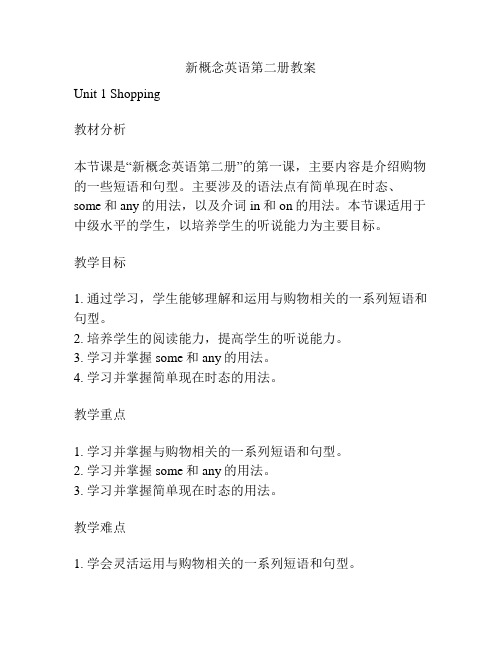
新概念英语第二册教案Unit 1 Shopping教材分析本节课是“新概念英语第二册”的第一课,主要内容是介绍购物的一些短语和句型。
主要涉及的语法点有简单现在时态、some和any的用法,以及介词in和on的用法。
本节课适用于中级水平的学生,以培养学生的听说能力为主要目标。
教学目标1. 通过学习,学生能够理解和运用与购物相关的一系列短语和句型。
2. 培养学生的阅读能力,提高学生的听说能力。
3. 学习并掌握some和any的用法。
4. 学习并掌握简单现在时态的用法。
教学重点1. 学习并掌握与购物相关的一系列短语和句型。
2. 学习并掌握some和any的用法。
3. 学习并掌握简单现在时态的用法。
教学难点1. 学会灵活运用与购物相关的一系列短语和句型。
2. 掌握some和any的用法。
教学准备1. 教师准备:教材、教师课件、多媒体设备。
2. 学生准备:课本、笔记本。
教学过程Step 1: Lead-in1. Greet the students and ask them some questions to warm up, such as:- Do you like shopping?- Where do you usually go shopping?- What do you usually buy when you go shopping?2. Show some pictures of shopping malls and supermarkets on the screen and ask the students:- Have you been to these places before?- Can you name some things that you can buy in a supermarket/shopping mall?Step 2: Presentation1. Present new vocabulary related to shopping by using flashcards or pictures on the screen.2. Teach the students some useful phrases and sentence structures related to shopping, such as:- Can I help you?- How much is it?- I'm just looking, thanks.- I would like to buy...3. Practice the new phrases and sentence structures with the students through role-play or group activities.Step 3: Grammar focus1. Teach the students the difference between some and any.2. Create some exercises to practice the use of some and any.3. Have the students complete the exercises individually or in pairs. Step 4: Reading comprehension1. Have the students read the dialogue on page 2 of the textbook.2. Discuss the questions that follow the dialogue, such as:- What is the woman looking for in the supermarket?- How much is the fish?- Does the woman buy the fish?3. Have the students discuss their answers in pairs or small groups. Step 5: Listening comprehension1. Play the audio recording of the dialogue.2. Have the students listen and answer the questions orally or in writing.Step 6: Role-play and practice1. Divide the students into pairs or small groups.2. Give each group a scenario, such as buying clothes, groceries, or electronics.3. Have the students role-play the scenarios and use the phrases and sentence structures they have learned.Step 7: Summary and homework1. Summarize the key points of the lesson.2. Assign homework, such as completing the exercises in the workbook or practicing the dialogue in pairs.教学反思本节课的教学目标主要是使学生掌握与购物相关的一些短语和句型,培养学生的听说能力。
新概念英语第二册Lesson 1精编课件PPT教案

New words and expressions
☆rudely 粗鲁地 rude 粗鲁的 eg.Don't be so rude to your friends polite 礼貌的
angry/angrily rude/rudely loud/loudly quiet/quietly
1. The writer got very _a_n_gr_y. That’s why he looked at them a_n_g_ri_ly.
New words and expressions
☆private adj.私人的 private letter. private life 私生活
privacy n.隐私
private school(私立学校) public school.公立学校 eg.public letter 公开信;public place 公
New words and expressions
☆angry adj.生气的 cross=angry be angry with sb 生某人的气 eg.My mother is angry with me at my
mistake. angrily生气地
New words and expressions
New words and expressions
☆seat n.座位 这个词很重要,考试常考。 在口语、电影里很常见:Is the seat taken? 请坐的3种说法: Sit down,please.(命令性) take your seat,please. Be seated,please.(更礼貌)
New words and expressions
☆theatre n.剧场,戏剧 [记忆]cinema 电影院 put on a play 上演戏剧 ☆loudly 大声地 eg.speak loudly,please eg.We shouldn't speak loudly in public place
新概念英语第二册全册教案
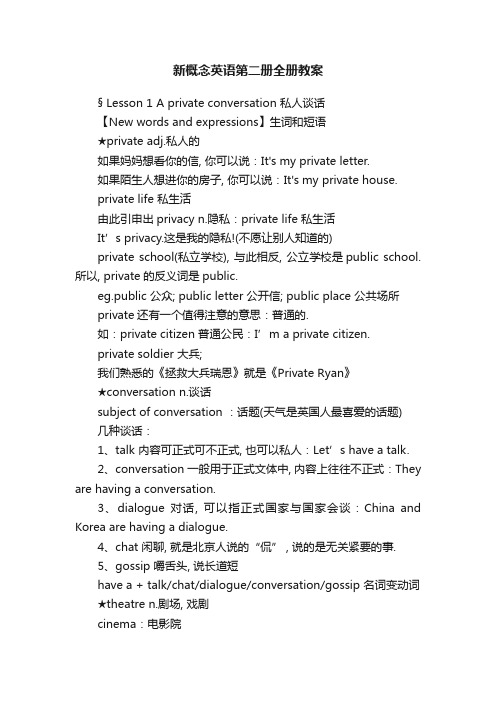
新概念英语第二册全册教案§ Lesson 1 A private conversation 私人谈话【New words and expressions】生词和短语★private adj.私人的如果妈妈想看你的信, 你可以说:It's my private letter.如果陌生人想进你的房子, 你可以说:It's my private house.private life 私生活由此引申出privacy n.隐私:private life 私生活It’s privacy.这是我的隐私!(不愿让别人知道的)private school(私立学校), 与此相反, 公立学校是public school.所以, private的反义词是public.eg.public 公众; public letter 公开信; public place 公共场所private还有一个值得注意的意思:普通的.如:private citizen 普通公民:I’m a private citizen.private soldier 大兵;我们熟悉的《拯救大兵瑞恩》就是《Private Ryan》★conversation n.谈话subject of conversation :话题(天气是英国人最喜爱的话题)几种谈话:1、talk 内容可正式可不正式, 也可以私人:Let’s have a talk.2、conversation 一般用于正式文体中, 内容上往往不正式:They are having a conversation.3、dialogue 对话, 可以指正式国家与国家会谈:China and Korea are having a dialogue.4、chat 闲聊, 就是北京人说的“侃” , 说的是无关紧要的事.5、gossip 嚼舌头, 说长道短have a + talk/chat/dialogue/conversation/gossip 名词变动词★theatre n.剧场, 戏剧cinema:电影院★seat n.座位这个词很重要, 考试常考.have a good seat,这里的seat指place(指地点不错), 而不是chair.take a seat/take your seat 坐下来, 就坐下面这个句子在口语、电影里很常见:Is the seat taken?(这个位置有人吗?)请坐的3种说法:Sit down,please.(命令性)take your seat,please.Be seated,please.(更礼貌)考点:作为动词的seat与sit的区别sit--vi; seat—vteg:He is sitting there.他住在那儿.You seat him.你给他找个位置.seat sb 让某人就坐,后面会加人eg:seat yourselft.Seat him.〖语法精粹〗4.When all those present(到场者)_D_ he began his lecture.(重点题)A.sitB.setC.seatedD.were seaedsit,sit down; seat,be seated;take a seat★play n.戏★loudly adv. 大声的★angry adj. 生气的cross=angry ; I was angry.He was cross.annoyed:恼火的;程I was annoyed.度I was angry/cross.加I was very angry.深be blue in the face :I am blue in the face.(脸色都青了, 相当生气了) ★angrily adv. 生气的副词修饰动词★attention n. 注意Attention ,please. 请注意(口语)pay attention :注意pay attention to :对什么注意You must pay attention to that gril.pay a little attention :稍加注意pay much attention :多加注意pay more attention :更多注意pay no attention :不用注意★bear(bore,borne) v. 容忍bear,standI can't bear/stand youendure :忍受,容忍put up with :忍受I got divorced.I could not put up with himbear/stand/endure忍受的极限在加大put up with=bear=standbear n.熊white bearbear hug :热情(热烈)的拥抱give sb a bear hug★business n. 事, 生意business man :生意人do business:做生意go to some place on business:因公出差I went to Tianjin on business.thing 可以指事情,也可以指东西business:某人自己的私人的事情It's my business (指私人的事, 自己处理的事)it's none of your business★rudely adv. 无礼地, 粗鲁地rude adj.【课文讲解】Last weekgo to the theatresee a film=go to the cinemago to the +地点表示去某地干嘛go to the doctor's 去看病go to the dairy 去牛奶店go to the + 人+ 's 表示去这个人开的店go to the butcher's 买肉go to school:去上学go to church:去做礼拜go to hospital(医院):去看病go to the Great Wallgo home; 跟home相连一定表示没有事情可做,回家休息I am at home 在家休息enjoy, enjoy oneself:玩的开心enjoy+sth :喜欢,从当中得到一种享受I like something very much./I love something.I enjoy the class.I enjoy the music.I enjoy the book.enjoy the dinner/film/progeam/gamewere sitting :当时正座在过去进行时态:过去的某个时间正在发生的动作一个故事的背景往往用进行时态描述I+be+v(ing)The girl was reading a book in the garden.A boy came to her. got :变得,表示一种变化,got angryI am/was angry 是一个事实I got angry:强调变化过程It is hot.It got hot.got取代be动词,got是一个半联系动词,可以直接加形容词说话的时候喜欢用缩略.I'm not,he isn't,they aren't写的时候会说:I am not,he is not,they are notI didn't do sth,I did not do sthhear:听见hear+人:听见某人的话I could not hear you.Beg your pardon?I couldn't hear you./I couldn't hear a word./I couldn't catch your word.I couldn't hear you clearly./I couldn't catch your words.Beg your pardon? /I couldn't catch your words.turn round:转头not pay any attention = pay no attention表示注意,pay attention; 对什么加以注意,pay attention to sth not any=noI could not bear it./you./the noise.I can't hear a word.hear a word :a word 等于一句话He didn't say a word.May I speak to Jim?/May I have a word with Jim?It's none of your business./None of your business/It's my business.I couldn't bear you.This is private conversation!private :私人的,不想与别人共享I can't hear a word.hear a word of sb (actors)Key stuctures :关键句型Summary writing :摘要写作answer this questions in not more than 55 words.【Key structures】关键句型Word order in simple statements:简单陈述句的语序陈述句一定是有主语,有动词,有宾语,有句号看教材第2页6 1 2 3 4 5 6 when? Who? Action Who? How? Where? When?Which? Which?What? What?Last week1 ---主语一般有名词或代词构成2 ---谓语由动词充当3 ---宾语4 ---副词或介词短语,对方式或状态提问,往往做状语I like her very much5 ---地点状语6 ---时间状语可以放在句首或句末I like the girl very much in Beijing last year. 简单陈述句一定不能少的是主语, 谓语.主语——>动词——>宾语——>状语状语:放在最前面是副词,方式状语,表示状态/程度的状语,下面是地点,然后是时间1.主语和动词不能少2.如果时间和地点连在一起,先放地点,再放时间如果问何时何地,是一个固定搭配when and where。
- 1、下载文档前请自行甄别文档内容的完整性,平台不提供额外的编辑、内容补充、找答案等附加服务。
- 2、"仅部分预览"的文档,不可在线预览部分如存在完整性等问题,可反馈申请退款(可完整预览的文档不适用该条件!)。
- 3、如文档侵犯您的权益,请联系客服反馈,我们会尽快为您处理(人工客服工作时间:9:00-18:30)。
课文:Last week I went to the theatre. I had a very good seat. The play was very interesting. I did not enjoy it. A young man and a young woman were sitting behind me. They were talking loudly. I got very angry. I could not hear the actors. I turned round. I looked at the man and the woman angrily they did not pay any attention. In the end, I could not bear it. I turned round again. “I can’t hear a word!” I said angrily.“It’s none of your business”, the young man said rudely, “This is a private conversation!”*本课重点语法:一般过去时、过去进行时英语的时态细分共有16种,其中较多用的为9种:第一课分析其中三种:一般现在时,一般过去时和过去进行时1.经常、反复或是习惯性发生的动作,如I go to work at 0900 every day. 我每天9点钟上班。
She does not take dinner on Sundays. 她周日晚上都不吃晚餐。
2.某种事物目前存在的情况或状态,如There are 16 cabins available on Classica Feb 18 dep.目前经典号0218航次剩余16个舱位。
3.表示主语的习惯、能力、职业、特征等,如Sunwen works as a sales manager in Costa, he has rich experience.4.有时间规律发生的事件或是不受时间限制的客观事实,如The earth moves around thesun. 地球绕着太阳转。
5. 表示格言或警句中。
Pride goes before a fall.骄者必败。
Practice makes perfect.一般现在时的构成:一般现在时用行为动词的原形,当主语为第三人称单数时( he, she, it, name),动词的词尾要加-S。
(一般的动词词尾+S。
以sh/ch/s/x结尾的词+es.以辅音字母Y结尾的把Y变成i,+es。
辅音字母+o结尾的+es.)一般现在时的疑问句助动词DO或Does+主语+动词原形+其它成分。
如Do I look okay? 我看起来还行吗?Does she speak English? 她学英语吗?练习翻译句子克拉拉是Classica的控舱主管(两种)表示过去某个时间发生的动作或存在的状态,通常我们讲述一件过去发生的事情会用这个时态。
动词过去式变化规则:1.一般在动词末尾加-ed,如:pull-pulled, cook-cooked2.结尾是e加d,如:taste-tasted3.末尾只有一个元音字母和一个辅音字母的重读闭音节,应双写末尾的辅音字母,再加-ed,如:stop-stopped4.以“辅音字母+y”结尾的,变y为i,再加-ed,如:study-studied5.不规则动词过去式:am,is-was are-were, do-did, see-saw, say-saidgive-gave, get- got, go-went, come-came, have-had,eat-ate, take-took, run-ran, sing-sang, put-put,make-made, read-read, write-wrote, draw-drew, drink-drank,fly-flew, ride-rode, speak-spoke, sweep-swept, buy-boughtswim-swam, sit-sat bring--brought can-could cut-cutbecome-became begin-began draw-drew feel-felt find-foundforget-forgot hear-heard keep-kept know-knewlearn-learnt (learned)leave-left let-let lose-lostmeet-met read-read sleep-slept speak-spoke take-tookteach-taught tell-told write-wrote wake-woke think-though练习:一、用be动词的适当形式填空。
1. I __am____ an English teacher now.2. She __was__ happy yesterday.3. They __were_____ glad to see each other last month.4. Helen and Nancy ____are____ good friends.5. The little dog ____is_ two years old this year.6. Look, there ____is____ lots of grapes here.7. There ______is__ a sign on the chair on last Monday.8. Today __is___ the second of June. Yesterday was______ the first of June. It ___is__Children’s Day. All the students __are____ very excited.二、句型转换。
There was a car in front of the house just now.否定句:______________________________________________一般疑问句:___________ 肯定回答:___________否定回答:__________2 They played football in the playground.否定句:________________________________________________三、用所给动词的适当形式填空。
1. I ______ (watch) a cartoon on Saturday.2. Her father _______ (read) a newspaper last night.3. We _________ to zoo yesterday, we _____ to the park. (go)4. ______ you _______ (visit) your relatives last Spring Festival?5. ______ he _______ (fly) a kite on Sunday? Yes, he ______.6. Gao Shan _______ (pull) up carrots last National Day holiday.7. I ____________ (sweep) the floor yesterday, but my mother ______.8. What _____ she _____ (find) in the garden last morning?She ____ (find) a beautiful butterfly.9. It ____ (be) Ben’s birthday last Friday10. We all ___ (have) a good time last night.11. He _____ (jump) high on last Sports Day. 12. Helen ____ (milk) a cow on Friday.13. She likes ______ newspapers, but she ______ a book yesterday. (read)14. He _______ football now, but they _______ basketball just now. (play)15. Jim’s mother _________ (plant) trees just now.16. _______ they ________ (sweep) the floor on Sunday? No, they _____.17. I _______ (watch) a cartoon on Monday.表示过去某个时间点正在进行的状态或动作,用法是描述一件事发生的背景;一个长动作发生的时候,另一个短动作发生,通常会带有时间状语如My brother fell while he was riding his bicycle and hurt himself.It was raining when they left the station.When I got to the top of the mountain, the sun was shining.典型例题1) Mary ___ a dress when she cut her finger.A. madeB. is makingC. was makingD. makes答案C. 割伤手指是已发生的事情,应用过去时。
同时,when表时间的同时性,"玛丽在做衣服时"提供事情发生的背景,因此用过去进行时。
2) As she ___ the newspaper, Granny ___ asleep.read;was falling B. was reading;fell C. was reading;was falling D. read;fell答案B.句中的as = when, while,意为"当……之时"。
描述一件事发生的背景时,用过去进行;一个长动作发生的时候,另一个短动作发生。
句意为"在她看报纸时,奶奶睡着了。
"句中的fell (fall的过去时),是系动词,后跟形容词,如:fall sick。
